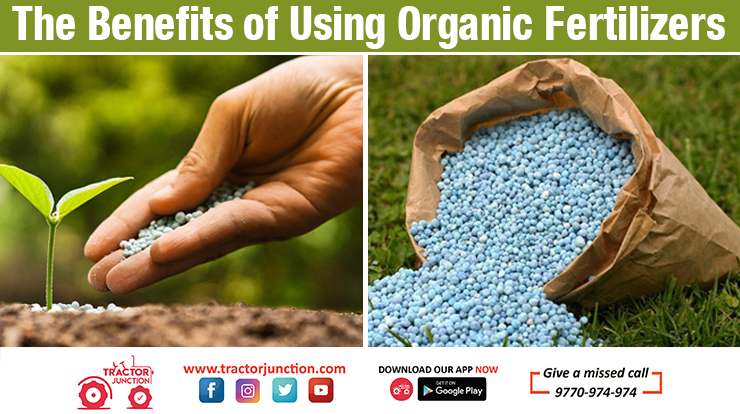
Fertilizers increase the development of plants. This objective is achieved in two processes, the regular one being addition that supplies nutrients. The second method by which various fertilizers act is to raise the potency of the soil by adjusting its water keeping and aeration. Fertilizers commonly supplied, in varying proportions. Fertilizers are categorized in many ways. They are classified as per whether they provide a single nutrient in that case they are categorized as “straight fertilizers.” “Multinutrient fertilizers” supply two or more nutrients. Fertilizers are also sometimes classified as inorganic fertilizers and organic fertilizers. The advantages of artificial fertilizers and organic fertilizers are mentioned in the below section. The Benefits of Using Organic Fertilizers – Organic Vs Inorganic Fertilizers.
What Is The Difference Between Organic and Inorganic Fertilizers?
Organic and inorganic fertilizers deliver crops with the nutrients required to grow healthy and robust. However, each carries separate elements and provides these nutrients in different ways. Organic fertilizers work overtime to generate a healthy growing environment, while inorganic fertilizers give speedy nutrition. The advantages of inorganic fertilizers and organic fertilizers are different as per the nutrients for growth. Types of organic fertilizers and inorganic fertilizers differ from each other.
Difference Between Organic vs Inorganic
| Basis | Organic | Inorganic |
| Availability of Nutrients | Only when the soil needs nutrients | Provide immediate nutrients |
| Application | Complex | Simple |
| Cost | More | Cheaper |
| Environmental Impacts | Heavy applications can Burn plants and build up to injurious salt heed in the soil, which can generate chemical imbalances. | Greenhouse gas Delivered into the atmosphere is lesser in organic fertilizer production. |
Benefits of Organic Fertilizers
Following we are showing some benefits of organic farming. Let’s check.
Organic Fertilizers Work Slowly.
The primary benefit of organic fertilizers is that they work slowly. They demand to be broken down by soil organisms for their nutrients to be delivered, and this takes time. Because they work slowly, nothing is misused. Organic fertilizers are slower than Inorganic fertilizers because of their work on the all-natural process.
Organic Fertilizers Upgrade The Soil.
Similar to most organisms, plants also require a variety of nutrients to grow correctly. The main vitamins or nutrients seen in fertilizer are potassium (K), phosphorus (P), and nitrogen (N). On the other hand, organic fertilizers enhance garden soil anywhere they are used. There are no disadvantages of organic matter in the soil. They not only assist with water retention, but they also make the soil lighter so that more air is available to the plant roots. Organic fertilizers don’t lose nutrients like their synthetic complements. The slow functioning nature of organic fertilizers is profitable if you’re looking to upgrade your garden soil over time. To obtain excellent and stable soil fertility, farmers assure a continuous supply of organic fertilizers to the ground. The most crucial source is deposits of the crops grown on the field itself, such as leaves, stalks, and roots, and they are used to the soil in the form of green fertilizer.
Are Organic Fertilizers Safe?
Yes, Organic fertilizers are safe for everyone like humans, animals, and also for pets. It is more reliable than Inorganic fertilizers because it is made up of manure, compost, or bone meal are obtained instantly from plant or animal sources. Organic fertilizers are widely recognized as a safer alternative to regular fertilizers. Organic fertilizers might also be more potent for your plants. As they are dropped by fertilizers, you won’t have to worry about long-term chemical build-ups that can be deadly to fields and plants. In general, fertilizers can usually happen with different chemicals or even salt.
Organic Fertilizers Are Simple To Apply.
Organics fertilizers are just as natural to apply as compared to non-organic or counterparts. Adding them to soil or sprinkling them on leaves is much more comfortable and convenient. Organic fertilizers require a meaningful amount of fossil fuels to produce and rule and often flow into nearby water sources like rivers and lakes. Organic fertilizers have countless advantages for your garden. Most of the farmers are uneducated; they even don’t know how to use fertilizers, but Organic fertilizers are easy and straightforward to apply on the soil.
In this blog, you will get all the additional information on synthetic fertilizer disadvantages and disadvantages of chemical fertilizers, and if you want to know more about how to maintain soil fertility, how to reduce fertilizers and pesticides, and many other then just visit Tractorjunction. All the solution to your problems is available here so stay connected with Tractorjunction.com.
FAQ’s
Q1. What is the difference between organic fertilizer and inorganic fertilizer?
Ans. Organic fertilizers originate from living sources such as plants, animals, and manure. Whereas, inorganic fertilizers are synthetically derived from chemicals and minerals found in the earth.
Q2. What are the primary benefits of using organic fertilizers?
Ans. The primary benefits of using organic fertilizers are improved soil health, reduced environmental harm, safer produce, and enhanced taste and quality.
Q3. Are there any downsides to using organic fertilizers?
Ans. Organic fertilizers may need more frequent use, causing slower growth initially, costing more, and being less available than inorganic options.
Q4. Is it possible to combine organic and inorganic fertilizers?
Ans. Yes, farmers practice integrated pest management, using a mix of organic and inorganic fertilizers.
Q5. How can I choose the right fertilizer for my garden or farm?
Ans. Consider factors like your soil type, plant needs, budget, environmental concerns, and desired level of control over nutrient release.
Related Searches:-
Importance of organic fertilizer pdf
Advantages and disadvantages of fertilizers ppt


